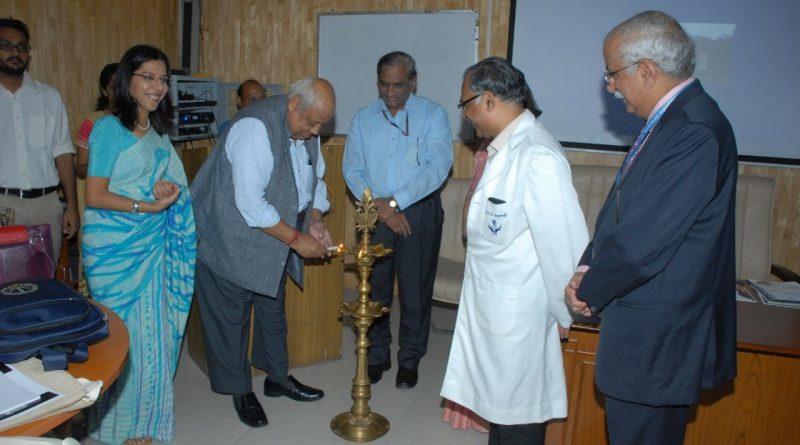Multi-Country Who Workshop On Ear And Hearing Care Held In New Delhi
The Department of Community Medicine, Maulana Azad Medical College and Associated Hospitals, New Delhi in collaboration with World Health Organization (WHO), Sound Hearing 2030 and Ministry of Health and Family Welfare, Government of India held a workshop on ear and hearing care at Maulana Azad Medical College, New Delhi from 3rd to 4th October 2018.
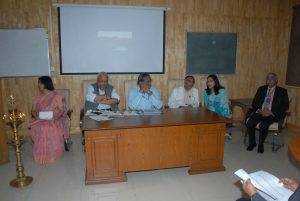
The meeting comprised the representatives from the Ministries of Health of South East Asian Region (SEAR), country experts of SEAR, representatives from Sound Hearing 2030, representatives from NGOs, and experts from different parts of India.
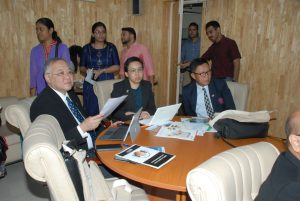
The programme started with the traditional auspicious lamp lightening ceremony by Dr S. Venkatesh (DDG Health, Ministry of Health and Family Welfare), Dr Patanjali Dev Nayar (Regional Advisor, Disability, Injury prevention and Rehabilitation, WHO), Dr Shelly Chadha (Technical Advisor, Prevention of Deafness and Hearing Loss, WHO HQ), Dr S. Ramji (Dean, MAMC), Dr A K Agarwal (Former Dean, MAMC) and Dr Suneela Garg (Director Professor and Head, Department of Community Medicine, MAMC and Secretary General, Society of Sound Hearing.

Dr Suneela Garg welcomed the international and national delegates to the WHO workshop on ear and hearing care in South East Asia Region and stressed on the objectives and importance of carrying out this workshop. The purpose of the workshop included importance of promoting ear and hearing care (EHC) in SEAR, sensitizing participants about EHC in global and regional perspective and role of World Hearing Forum and SH 2030 in strengthening EHC. She also emphasized on role of strengthening health care systems to promote EHC.
Dr S. Venkatesh stressed on the importance of hearing in good language development and the overall personality development of an individual. In the absence of timely redressal, hearing impairment and deafness could profoundly impact both the patient and his family. It hampers education, employment, emotional and overall development. The global burden of hearing loss is at 14th rank in terms of DALYs and 2nd rank among causes for YLDs globally and contributed an estimated $750 billion loss in 2015. The DG also elaborated on the risk factors of hearing loss like noise, persistence of untreated ear infections, complications at birth, chronic ear infections and use of ototoxic drugs and reminded that most of which could be prevented.
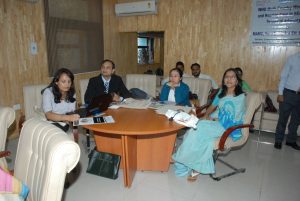
He further informed that globally 1 in 3 people aged more than 65 years’ experience disabling hearing loss which could be managed effectively by the correct use of hearing aids and other accessories. He also stressed that our public health strategies should inculcate prevention of hearing impairment and thrown light on the need of appropriate public health policies.
He visualized the workshop as an exciting platform for sharing the experiences across SEAR countries and to share learnings from sustainable initiatives and the identification of unmet needs. He informed that India had become 71st country in the world to launch a National Health Programme for Prevention of Hearing Loss. He further mentioned that hearing care services were included under the Ayushman Bharat program of the Government of India. Nearly 150,000 health and wellness centers are to be set up in India of which over 3,000 are already functional.
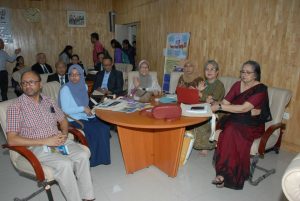
The PM’s Jan Arogya Yojana (National Health Protection Program) would provide insurance cover to 500 million people who were most vulnerable to out of pocket expenses involved in in-patient and hospital care.
Dr S. Ramji emphasized on the challenges in early detection and prevention of hearing loss and in the rehabilitation of people with hearing loss. He focussed on the role of health care functionaries for early detection of hearing loss and he expected that the deafness control programmes run by the countries in the SEAR region will be able to delineate opportunities and pathways for other countries in preventing and reducing hearing loss. As a paediatrician, he stressed on the challenges encountered for universal hearing screening.
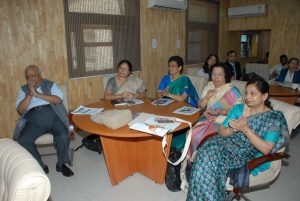
Dr Patanjali Dev Nayar stressed on the need of skills, values and research needed for the prevention of deafness and hearing impairment. Dr. Nayar focused on the role of Governments in push hearing programs which can improve the lives of people across SEAR with its diversity in population and resources; need for strengthening deafness control activities in SEAR and WHO’s requirement of partners, NGOs, activists, parent groups and effective strategies with appropriate implementation and actionable points required to be derived from this meeting.
Dr. A K Agarwal remarked that the workshop would promote the sharing of experiences from all countries in the SEAR to understand challenges before us, list best practices, learn sustainable initiatives, reach underserved groups, fill gaps in evidence, comprehensive hearing services, from promotion of ear care and rehabilitation. He also emphasized on the role of Sound Hearing 2030 for strengthening ear and hearing care in the region.
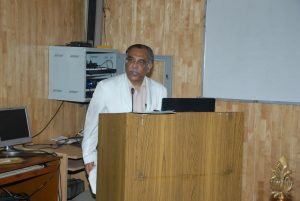
Dr. Suneela Garg gave vote of thanks during which she stressed upon the need of building healthy public health policies across SEAR and to adhere to a life-course approach towards hearing health.
The technical sessions started with presentation by Dr. Shelly Chadha who deliberated on global perspective of ear and hearing care and expressed her concern on the growing prevalence of hearing impairment as statistics have shown that according to current trend, there would be around 600 million people with disabling hearing loss by end of 2030. Dr. Chadha also mentioned that over a billion of young people are at risk of hearing loss due to use of ear phones and discussed potential solutions to prevent the disabling hearing loss.
Dr. Chadha told that WHA (World Health Assembly) 2017 has adopted a resolution on the issue of hearing loss and its abiding relevance in furthering the global quest for protecting hearing health. She explained the WHO dual approach in preventing hearing loss which includes advocacy regarding development of National Programme for Prevention and Control of Hearing Loss and capacity development in terms of human resource, equipment and infrastructures.
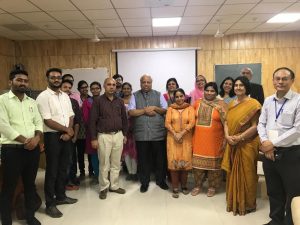
Dr. Chadha also told that WHO advocates the member states to observe World Hearing Day on 3rd of March every year. She informed about World Report on Hearing to be launched on 3rd March 2020. She also told that the WHO has initiated the “Make listening safe initiative” with a vision to ensure that people of all ages can enjoy listening to music with full protection of their hearing. She mentioned about the strategies undertaken by WHO in addressing the burden of HL.
Dr. Agarwal commented that every possible action should be undertaken in order to address this huge unaddressed burden of HL.
Dr. Patanjali Dev Nayar talked on the theme relating to ear and hearing care: regional perspective. He expressed concern that there are very less number of ENT specialists available in SEAR countries along with inadequate availability of equipment, infrastructure and speech therapists.
He explained about the impact of hearing loss in terms of monetary loss, emotional trauma and suffering of the family members of person with hearing loss. He explained about the barriers in ear and hearing care like lack of awareness, poor availability of trained human resource, non-availability of training for primary level service providers and higher cost of hearing aids.
He highlighted the need to augment healthcare resources including human resource, equipment and rehabilitative services and need for innovation in strengthening services and elimination of barriers.
He focussed on strategic use of resources that can go a long way in addressing this problem.
Dr. Suneela Garg discussed the importance of promoting EHC in this region for attaining universal health coverage (UHC). She told that not only the number of services but also the quality of services are important to justify UHC which requires upholding the three pillars of health equity, good quality services and financial protection.
She expressed concern on the growing burden of hearing loss and deafness globally since an estimated 900 million people will be having hearing loss by 2050 which would exponentially increase the economic burden of hearing loss and hinder overall global development. She indicated the need for identifying the priority areas.
She also outlined the measures to improve the EHC in SEAR. She recommended integration of eye and ear care in order to achieve effective utilisation of available human resources. She also explained about the importance of IEC activities in strengthening of the current programme.
She also explained about the effect of ototoxic drugs and the need for surveillance. She concluded with the statement that no programme is successful until it includes periodic monitoring.
Dr Mohan Kameswaran spoke on the programme implementation in Tamil Nadu and India. He started with prominent sentence that blindness isolates people from objects while deafness isolates people from people. He explained that cochlear implant is a scientific miracle in treatment of people with deafness.
He also expressed his concern about the effect of consanguineous marriage, which is more prevalent in Tamil Nadu and other parts of southern India, on increasing the prevalence of hearing loss and deafness. He further explained various measures taken for prevention and treatment of deafness under CM’s comprehensive health scheme.
He explained about the Hub and Spoke model of rehabilitation. He also informed about various fellowships in relation to otology and rehabilitation of people with hearing loss which helps in capacity building of human resources.
He illustrated the role of satellite centres in reducing the barrier of distance to enhance utilization of health services in case of hearing loss and deafness. He elaborated on the Vision 2025: Deafness Free Tamil Nadu Initiative. He informed that Tamil Nadu is the only region in the world to provide free brain stem implants. He hoped that the lessons learnt from India would be useful to other developing countries with similar problems.
Commenting on the above, Dr AK Agarwal told that after Tamil Nadu many other states in India have started their own programmes for prevention and control of hearing loss and management of deafness. The role of RBSK (Rashtriya Bal Swasthya Karyakram) was also discussed during the session.
Dr. Bulantrisna talked about the project Sound Hearing 2030 as a community-based approach for sound hearing. She explained the goal and mission of the Society for Sound Hearing International, development and evolution of the organization and the various activities carried out by it.
Dr M. Meghachandra Singh elaborated on the key Sound Hearing 2030 activities. This included the development of training modules for all levels of healthcare workers in collaboration with Ministry of Health and Family Welfare, India. He also supported promoting partnerships with national and international NGOs/DPOs and various MoUs being executed with Vision 2020 and Global Coalition. He also mentioned that Sound Hearing India has developed lot of IEC materials (charts, posters, flipcharts, pamphlets, radio jingles, short videos etc.). These posters were extensively utilized by the SEAR countries as well as other regions.
Dr. A K Agarwal spoke on World Hearing Forum (WHF) which was established in July 2018 and delineated its various roles and responsibilities.

